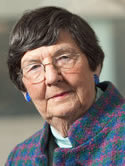Effect of adjuvant breast cancer chemotherapy on cognitive function from the older patient's perspective Journal Article
| Authors: | Hurria, A.; Goldfarb, S.; Rosen, C.; Holland, J.; Zuckerman, E.; Lachs, M. S.; Witmer, M.; Van Gorp, W. G.; Fornier, M.; D'Andrea, G.; Moasser, M.; Dang, C.; Van Poznak, C.; Robson, M.; Currie, V. E.; Theodoulou, M.; Norton, L.; Hudis, C. |
| Article Title: | Effect of adjuvant breast cancer chemotherapy on cognitive function from the older patient's perspective |
| Abstract: | Purpose. This longitudinal prospective study describes the older breast cancer patient's perception of the cognitive impact of adjuvant chemotherapy. Methods. A total of 50 patients ≥age 65 with stage I to III breast cancer enrolled in this IRB-approved prospective study. Of the 50, 3 refused postchemotherapy testing and 2 had a cerebrovascular accident (CVA) during therapy, leaving 45 evaluable patients. The Squire Memory Self-Rating Questionnaire, given before and 6 months after chemotherapy, measured patients' perceptions of the ability to learn new information, of working memory, and of remote learning capabilities. Results. Mean age was 70 years (range 65-84). Breast cancer stages were: I (33%), II (64%), III (2%). A 51% (23/45) of study participants perceived a decline in memory from before to 6 months after completion of chemotherapy. Patients who perceived a poorer memory than average before chemotherapy were more likely to report further memory deterioration after chemotherapy (19/30, 63%) than patients who perceived that their memory was average or better than average prior to chemotherapy (4/15, 27%). The memory domain most likely to be perceived as affected was the ability to learn new information (22/45, 49%) compared to remote memory (9/45, 20%) or working memory (13/45, 29%) capabilities. Conclusion. Approximately half of these older women perceived a decline in cognitive function from before to 6 months after chemotherapy. This perceived decline in cognitive function was most pronounced in patients with preexisting memory complaints. Further prospective study is needed to confirm these observations, correlate perceived memory changes with objective findings, and identify subgroups at special risk. © Springer 2006. |
| Keywords: | clinical article; aged; aged, 80 and over; clinical trial; doxorubicin; fluorouracil; antineoplastic agents; paclitaxel; cancer adjuvant therapy; chemotherapy, adjuvant; methotrexate; cancer staging; breast cancer; antineoplastic combined chemotherapy protocols; cyclophosphamide; breast neoplasms; questionnaire; adjuvant chemotherapy; cognition; aging; high risk population; memory disorder; memory; trastuzumab; cerebrovascular accident; learning; working memory; cognitive function; neuropsychological; squire memory self rating questionnaire |
| Journal Title: | Breast Cancer Research and Treatment |
| Volume: | 98 |
| Issue: | 3 |
| ISSN: | 0167-6806 |
| Publisher: | Springer |
| Date Published: | 2006-08-01 |
| Start Page: | 343 |
| End Page: | 348 |
| Language: | English |
| DOI: | 10.1007/s10549-006-9171-6 |
| PUBMED: | 16541322 |
| PROVIDER: | scopus |
| DOI/URL: | |
| Notes: | --- - "Cited By (since 1996): 27" - "Export Date: 4 June 2012" - "CODEN: BCTRD" - "Source: Scopus" |
Altmetric
Citation Impact
BMJ Impact Analytics
MSK Authors
Related MSK Work











